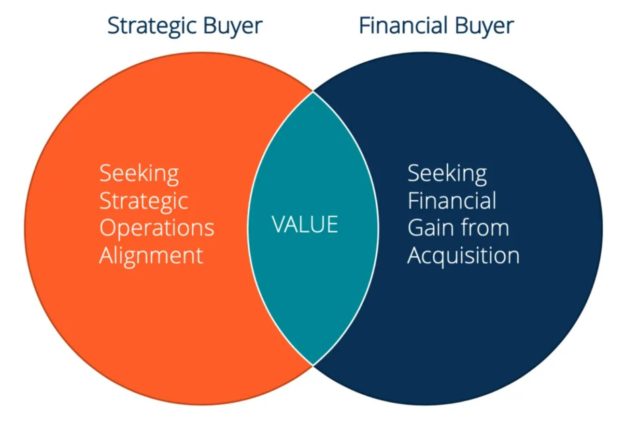If you are thinking about selling your companies, you have to check whether you are familiar with the concepts of the financial and strategic buyer. This will help you sell your organization more profitably and effectively, but you need to learn the nuances and differences between the two. In this article, we’ll break down these concepts in detail so that you can determine which, strategic vs financial buyer, you need.
What is a financial buyer?
For a financial buyer, buying a company equals an investment. They work to find a worthy target company, invest in it, and get the most out of it. For a financial buyer, the industry and operation of the company don’t matter much; they are willing to invest in any company, not just those that are compatible with their operations.
To increase their profits, financial buyers try different schemes, for example, participating in profitable projects, reducing costs, and creating the effect of scale. After the acquired company has brought him all possible profits, he either conducts an IPO and makes it public, or sells it directly.
Before buying a company, the financial buyer studies its financial statements in detail, so that he can understand whether his investment will pay off. By and large, such buyers are not interested in anything but financial statements.
It is not uncommon for a financial buyer to finance a company with borrowed money, in which case the lender who has cooperated with the buyer receives his profits through the loan rate.
What is a strategic buyer?
Strategic buyers tend to be large and successful companies for whom the target company must match their business plans. For example, a buyer plans to vertically integrate, open and explore new markets and products, get rid of competition, or overcome company weaknesses, and to do so he needs to buy a business that is engaged in similar activities.
The strategic buyer is also willing to pay a higher amount than the financial buyer because he is in a much better position to get quick and maximum synergy out of the deal. This is because the company can realize economies of scale through integrated operations.
The strategic buyer can pay for the purchase in several ways, such as by buying shares of the target company, cash, or a combination of the two.
Who is the best buyer?
The answer to this question will vary from seller to seller depending on their goals. Below we describe what the seller’s goals may be, and which buyer would then be right for him:
- The seller is looking for a return – if the only thing that matters to the seller is the amount he gets from the sale, then a strategic buyer would be the best option for him, for obvious reasons
- If the seller wants to request covenants-if, in conjunction with the profit, the seller is also worried about the fate of his business and its employees, then a strategic buyer is also still a priority. But with the contract, you need to set conditions so that the deal also goes in his favor
- If the seller wants money but also wants to continue to run the business – then you are better suited to a financial buyer. After all, the profit he will get from the investment is important to him, but he doesn’t always have the right knowledge and experience to make it happen. So, you can keep your position and responsibilities as a manager in your business, but still, work to recoup the financial buyer’s investment

